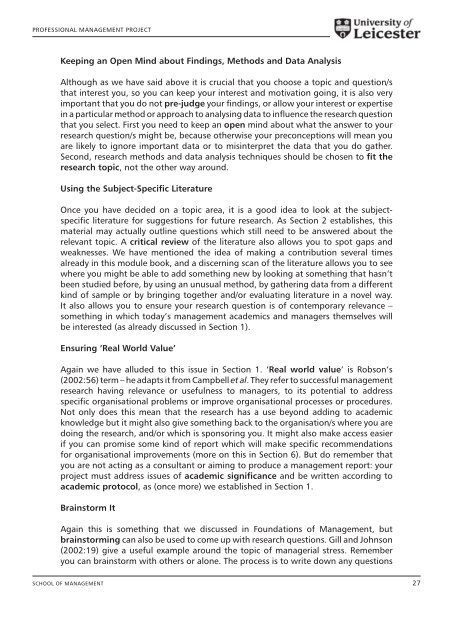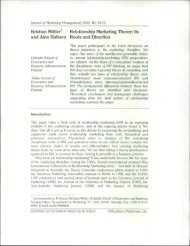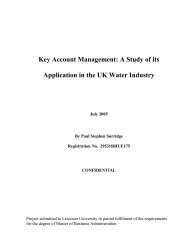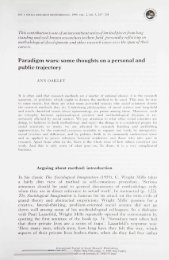PMP module book final.pdf - Blackboard - University of Leicester
PMP module book final.pdf - Blackboard - University of Leicester
PMP module book final.pdf - Blackboard - University of Leicester
Create successful ePaper yourself
Turn your PDF publications into a flip-book with our unique Google optimized e-Paper software.
PROFESSIONAL MANAGEMENT PROJECT<br />
Keeping an Open Mind about Findings, Methods and Data Analysis<br />
Although as we have said above it is crucial that you choose a topic and question/s<br />
that interest you, so you can keep your interest and motivation going, it is also very<br />
important that you do not pre-judge your findings, or allow your interest or expertise<br />
in a particular method or approach to analysing data to influence the research question<br />
that you select. First you need to keep an open mind about what the answer to your<br />
research question/s might be, because otherwise your preconceptions will mean you<br />
are likely to ignore important data or to misinterpret the data that you do gather.<br />
Second, research methods and data analysis techniques should be chosen to fit the<br />
research topic, not the other way around.<br />
Using the Subject-Specific Literature<br />
Once you have decided on a topic area, it is a good idea to look at the subjectspecific<br />
literature for suggestions for future research. As Section 2 establishes, this<br />
material may actually outline questions which still need to be answered about the<br />
relevant topic. A critical review <strong>of</strong> the literature also allows you to spot gaps and<br />
weaknesses. We have mentioned the idea <strong>of</strong> making a contribution several times<br />
already in this <strong>module</strong> <strong>book</strong>, and a discerning scan <strong>of</strong> the literature allows you to see<br />
where you might be able to add something new by looking at something that hasn’t<br />
been studied before, by using an unusual method, by gathering data from a different<br />
kind <strong>of</strong> sample or by bringing together and/or evaluating literature in a novel way.<br />
It also allows you to ensure your research question is <strong>of</strong> contemporary relevance –<br />
something in which today’s management academics and managers themselves will<br />
be interested (as already discussed in Section 1).<br />
Ensuring ‘Real World Value’<br />
Again we have alluded to this issue in Section 1. ‘Real world value’ is Robson’s<br />
(2002:56) term – he adapts it from Campbell et al. They refer to successful management<br />
research having relevance or usefulness to managers, to its potential to address<br />
specific organisational problems or improve organisational processes or procedures.<br />
Not only does this mean that the research has a use beyond adding to academic<br />
knowledge but it might also give something back to the organisation/s where you are<br />
doing the research, and/or which is sponsoring you. It might also make access easier<br />
if you can promise some kind <strong>of</strong> report which will make specific recommendations<br />
for organisational improvements (more on this in Section 6). But do remember that<br />
you are not acting as a consultant or aiming to produce a management report: your<br />
project must address issues <strong>of</strong> academic significance and be written according to<br />
academic protocol, as (once more) we established in Section 1.<br />
Brainstorm It<br />
Again this is something that we discussed in Foundations <strong>of</strong> Management, but<br />
brainstorming can also be used to come up with research questions. Gill and Johnson<br />
(2002:19) give a useful example around the topic <strong>of</strong> managerial stress. Remember<br />
you can brainstorm with others or alone. The process is to write down any questions<br />
SChOOL OF MANAGEMENT 27






